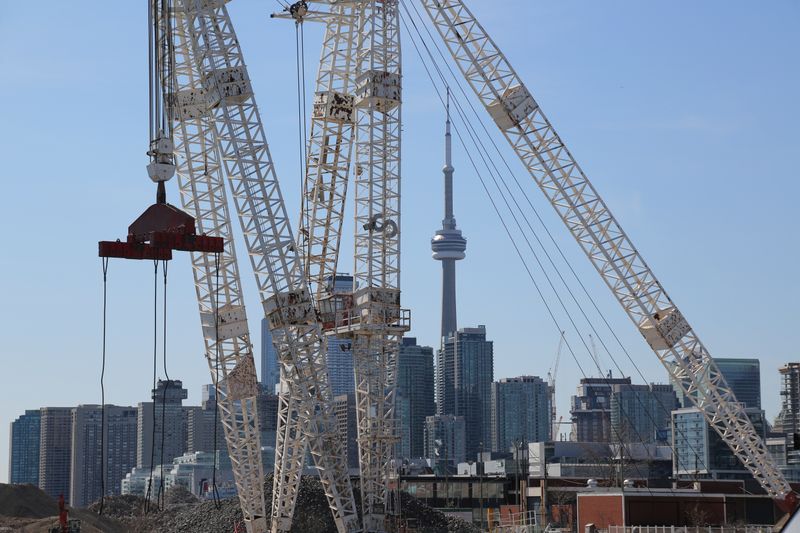By Indradip Ghosh
BENGALURU (Reuters) - The Canadian economic recovery from the coronavirus recession will be significantly slower than previously thought, with a high risk a resurgence in cases will halt the rebound underway, according to a Reuters poll of economists.
Over 41 million people globally have been infected by the virus and the death toll has crossed the 1.1 million mark.
The emergence of a second round of infections in major Canadian cities, which have managed to suppress the virus far more effectively than their American cousins, has increased the chances of a severe health and economic crisis.
Renewed lockdown restrictions to limit that surge would damage the recovery in the economy after it contracted at an annualized rate of 8.2% and 38.7% in the first and second quarters of this year, respectively.
The Oct. 15-21 poll of nearly 50 economists predicted the economy expanded a record annualized 44.5% in Q3, faster than 30.0% growth predicted in July. But growth was expected to slow to 5.0% and 5.2% in Q4 2020 and Q1 2021, respectively.
Those forecasts for the current quarter and early next year were significantly lower than 10.0% and 7.0% predicted just three months ago.
"The second wave has already forced Ontario and Quebec to shut down businesses like restaurants, bars, and gyms for 28 days. Only with the virus under control can provinces safely reopen the entire economy. Until then, the next phase of the recovery will be slow and choppy," said Sri Thanabalasingam, senior economist at TD.
Nearly 60% of respondents, or 12 of 21, to an additional question said the risk the resurgence in coronavirus cases would halt the recovery was either "high" or "very high."
This year, the economy was forecast to shrink 5.9%, its worst performance in at least six decades.
While that forecast was an improvement from -6.8% predicted in July, the 2021 recovery was downgraded to 5.0% next year from 5.2. Economists expected a slowdown to 2.8% in 2022.
The unemployment rate was forecast to stay above pre-COVID-19 levels until 2023 at least, despite predictions for a gradual decline.
Inflation was forecast to average 0.7%, 1.6% and 1.9% this year, next and in 2022, respectively.
The Bank of Canada - which cut its key interest rate by a cumulative 150 basis points this year and implemented its first-ever quantitative easing program - was expected to hold the overnight rate at 0.25% through to end-2023.
Governor Tiff Macklem has said negative rates - which the European Central Bank and the Bank of Japan have implemented - were not discussed actively by the BoC, but he did hint recently it was an option if needed.
But all 20 economists with a view said the Canadian central bank should not do it.
"Lowering interest rates below zero would likely have only a marginally positive impact on economic growth," said Tony Stillo, director of Canada economics at Oxford Economics.
"However, the potential downside implications of such a move on the financial system and broader economy would likely outweigh any positive impacts, especially in the medium to longer term."

Reuters poll graphic on Canada economic growth and monetary policy outlook: https://fingfx.thomsonreuters.com/gfx/polling/qmyvmjjmopr/Canada%20economy.PNG
(Reporting and polling by Indradip Ghosh and Vivek Mishra; Editing by Ross Finley and Steve Orlofsky)
